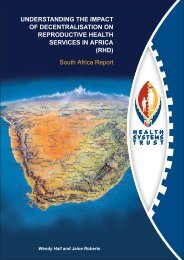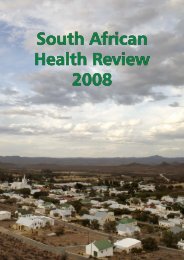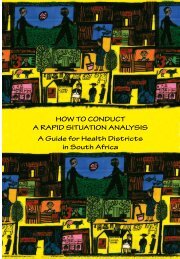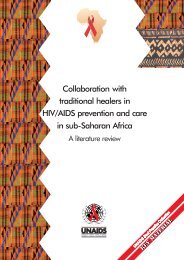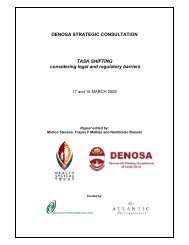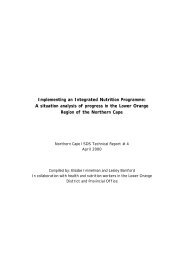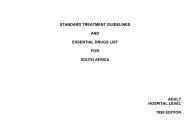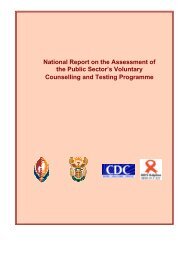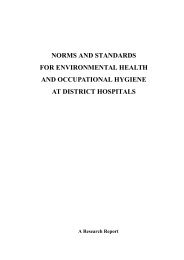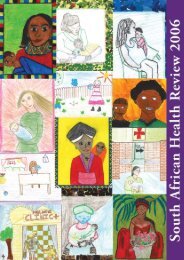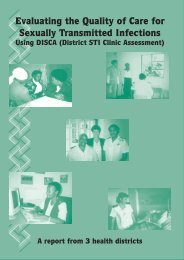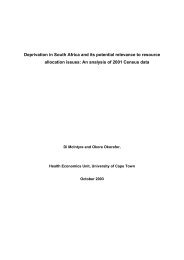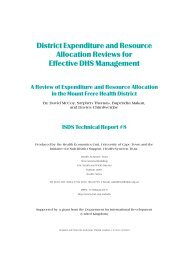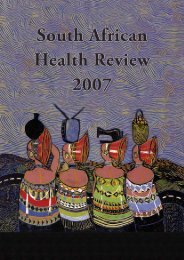COMMUNITY BASED SITUATIONAL ANALYSIS Maternal and ...
COMMUNITY BASED SITUATIONAL ANALYSIS Maternal and ...
COMMUNITY BASED SITUATIONAL ANALYSIS Maternal and ...
You also want an ePaper? Increase the reach of your titles
YUMPU automatically turns print PDFs into web optimized ePapers that Google loves.
ealising the seriousness of his condition, planned to take the child to a paediatrician in the<br />
morning. However, the baby died at three o’clock in the morning, before she was able to seek<br />
health care.<br />
It is possible that mothers are not being educated by health care providers attending them<br />
about danger signs to watch for at home. For example, a Rietvlei mother reported that her<br />
infant was treated at a clinic <strong>and</strong> then referred to hospital for his cough. This baby was admitted<br />
to the hospital for a week after which he was discharged <strong>and</strong> showed improvement. The next<br />
week, however, the baby started breathing very fast <strong>and</strong> died after a few days. She reported<br />
that she did not take him back to hospital because she thought the treatment the hospital had<br />
already given him would eventually cure him. Had she been instructed on the steps to take if<br />
the infant’s health deteriorated, it is possible that he would have been taken back to the<br />
hospital for additional care <strong>and</strong> could have survived this illness.<br />
Poor quality of care: The experiences reported by respondents suggest that the quality of<br />
care received in many instances was sub-st<strong>and</strong>ard. For example, some mothers who took their<br />
infants for care reported that they were sent home with paracetamol or electrolyte sachets<br />
when perhaps the infant should have been admitted. A mother in Rietvlei reported that she took<br />
her sick infant to hospital, was given medicine <strong>and</strong> then sent home. The child died at home<br />
later that day. In other cases, mothers recounted that their infants died on the way home after<br />
having been admitted <strong>and</strong> discharged from hospital. One Rietvlei mother recounted how her<br />
baby was discharged from hospital while still showing signs of weakness <strong>and</strong> a sunken<br />
fontanel. The baby fell asleep on the way home <strong>and</strong> when she arrived at home she realised the<br />
baby had died. Another Rietvlei mother reported that her child was admitted for three weeks<br />
with cough, vomiting <strong>and</strong> fever. The staff advised the mother to take the child home where she<br />
then died after two days.<br />
Some mothers reported taking their infants to a clinic but that the clinic did not have appropriate<br />
medication. When asked if they have any ideas “for how health care facilities <strong>and</strong> providers can<br />
better serve families…with sick infants,” several mothers suggested that it is of primary<br />
importance that clinics have enough stocks of medicines. One mother stated:<br />
“It is not nice to go to the clinic seeking help <strong>and</strong> you end up not getting that help you needed.”<br />
Another mother suggested that the most important thing needed to improve care is:<br />
“[i]f facilities could improve on the long hours people (sick people) endure before being<br />
attended [to].”<br />
One respondent stated that her baby got sick at night but that she could not get transport until<br />
the next morning. When they got to the health facility, they had to wait for several hours to be<br />
seen. By that time, her baby was already gravely ill.<br />
Many respondents reported that they did not know the cause of their infant’s death. This<br />
occurred even among some women whose infants had died in hospital. They reported that staff<br />
did not take the time to explain to them what happened, <strong>and</strong> they did not feel that they had the<br />
right to ask. These mothers expressed grave disappointment about their experiences with<br />
facility staff. For example, one mother who seemed to have accepted the fate of her baby (she<br />
believed that it was her baby’s death day – "kwase kufike usuku”) became very tearful when<br />
recounting how she had been treated at the facility.<br />
Community Based Situation Analysis: <strong>Maternal</strong> & Neonatal Follow-up Care 32



